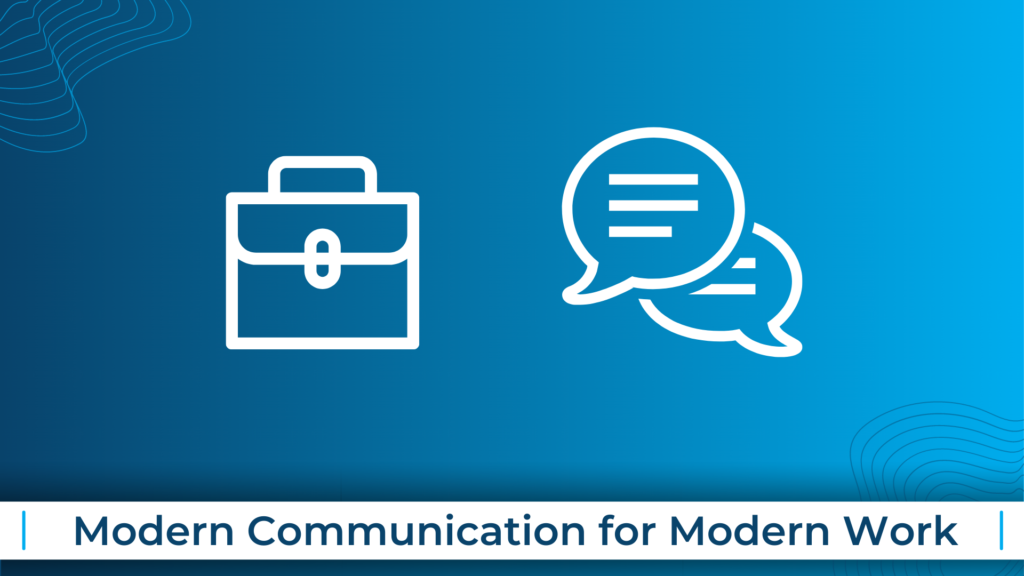
Modern Communication for Modern Work
The world has changed in many ways in recent years – nothing is more developed than our reliance on technology in our day-to-day tasks – at work and in our leisure time. It will only grow as we discover new ways to use our time with technologies that speed up our work processes.
Despite all the importance that technology has in our working lives, there is an even more important component that will ensure a successful workplace, and that is communication. Without effective communication (between partners, suppliers and your customers), your business is unlikely to succeed.
With the world of technology, the ways we communicate have also changed. Let’s look at some of the systems that an organisation already uses to communicate and see why these methods are outdated and require a new approach.
Business communication – the old-fashioned way
Phone
Most people think of a phone when it comes to business communication. The modern world of work – despite all its lightness and modernization of work processes – still relies quite heavily on the phone. The ability to use your voice and tone to express emotions and persuade you to say makes this approach the ‘go to’ for most people when it comes to communication. As such, there are alternatives on the market today that offer more than just a simple phone call – Zoom and Microsoft Teams, to name two of the most popular. This is not us saying that you need to completely eradicate your telephone systems, but we encourage you to find out where your telephone system can benefit from modern change to make it more efficient for modern practice.
Why?
Your phone is fine, so why change it? A perfectly understandable thought to have along with “why change something that isn’t be broken?”
Traditional landline technology has had its time – the modern world of work requires you to be in constant contact, without any excuses! In the world of Social Media, if a client can’t get hold of you, it can be detrimental to the organisation in the long run. The phone is the primary link between you, your customers and your suppliers, so if you plan to achieve the level of collaboration, communication and productivity needed to make your organisation successful, it’s important that you are always in touch. You cannot allow anything – not even unexpected power outages or floods to prevent this from happening.
Recently, e-mail has been one of the most important forms of workplace communication. The opportunities for messengers in the market at the time – MSN, for example – were not business-oriented, but it was the business world that led to the popularity of e-mail, which grew tremendously. Email companies have been helping to communicate since the 1970s, but is that enough in the modern world?
Why?
Spam! Punishment of the working day for many people. Spam is the main reason why people hate emails. They always come from the companies you once talked to, or a weekly newsletter from a company you are not interested in, while trying to complete your daily tasks. Yes, spam filters are improving, but that hasn’t stopped the numbers from rising to an incredible 85% of emails being spam. No one has the time to sit and sift through endless spam! You need to find important emails instantly.
Meetings
Traditionally, meetings take place in a meeting room with the team sat around a table, notepad in hand. This way of conducting meetings is a laborious task regardless of the digital landscape of the workplace, finding the best time for every team member to be free to attend can be laborious – and the likelihood of getting the team to come in on their allotted days off was highly unlikely. With the modern world of work being a remote one, businesses have had to find an alternative. We will explore this more later in the blog series.
In our next blog, we’ll look at the modern alternatives to communication and how they have the power to transform your workplace and drive future success, if used properly.
The right IT support for you
Our team of experts has one goal in mind; we want to bear the burden of your IT support for you. We succeed in engaging our clients to build positive relationships based on a common desire to help your organization succeed. We are here to help your company stay safe and help its long-term success and growth. Feel free to contact us if you are interested in seeing what we can do for you.
Comments are closed.